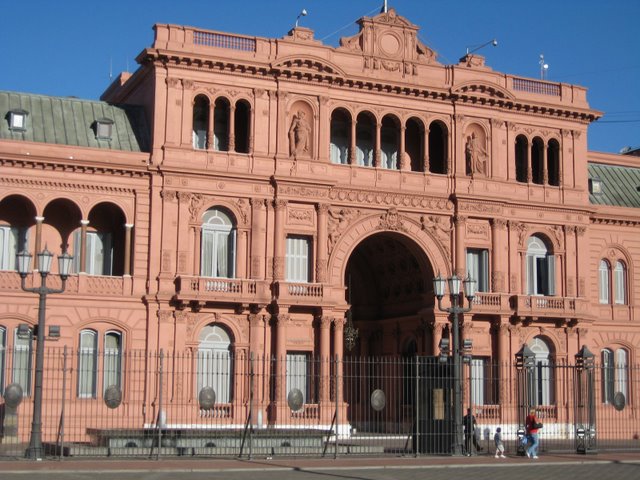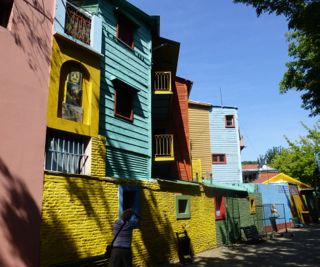Buenos Aires : ARGENTINA
Living a College Town Lifestyle in Buenos Aires, ARGENTINA
Internationally renowned, and a bubbling college city, Buenos Aires, or BA, is the capital of Argentina. In many ways, it is the capital of South America. When the Argentinean economy collapsed in 2001, foreigners saw a fabulous opportunity for investment. With gorgeous architecture, world class shopping and a well designed city with strong transportation in place, many ex-pats bought into the city at extremely cheap prices. The economy has recovered rapidly (although I can’t speak to the effect the current crisis is having upon the country), and prices are very high compared to the rest of South America. However, what you get compared with what you pay is astounding. Restaurants, museums and boutiques are all at near New York quality, yet prices don’t come near the astronomical levels charged up north. For example, in the newly developing waterfront area, Puerto Madryn, an extremely gourmet Italian restaurant charges about $10 for a pre-fixed three course lunch.
The University of Buenos Aires is here, the producer of five Nobel prize winners; it offers taxpayer-funded education to students from all over the world. This college, among the many others here, create a wonderful cultural atmosphere.
Buenos Aires has so much to do. Wandering through the wide, tree lined streets, you encounter gorgeous architecture, antique plazas and churches, as well as new apartment buildings and shops. Many of the best museums in Latin America are here. The Museo Nacional de Bellas Artes, Museo Eva Péron, and MALBA are just a few of the impressive collections in the city, offering European fine art, Argentinean history, Latin American art, and modern art and architecture. The city has every convenience one needs- from yoga studios, parks for running, grills and international cuisine, to enormous grocery stores and antique markets.
Where to Retire in Buenos Aires and Home Prices
The city is divided into several barrios, or neighborhoods. San Telmo and La Boca offer a look at the real, working class Buenos Aires. Recoleta (very French), Barrio Norte, Puerto Madryn and Palermo are probably better areas for ex-pats. Most foreigners live in these more upscale neighborhoods for the safety, charm, parks, many restaurants, cafes and shops.
Apartments range from $800-$4000/month. Each area is distinct; get a sense before deciding.
What Is Special about Buenos Aires
Old meets new in BA. Plazas, cathedrals and buildings that have been around for centuries are next to new, gourmet restaurants. There is a large population of ex-pats and students in the city, so it is fairly easy to find a sense of community even in a foreign country. Because of this, sticking to English is no problem most of the time. This city feels like Paris, but prices aren't Parisian. The Recolleto, an old cemetery for the city's wealthy departed, is one of the most amazing sites because of the elaborate mausoleums. Evita Peron is buried in one of them.
What Is Not Special about Buenos Aires
Argentina is a deal in many ways, but they are currently experiencing rapid inflation. This is a big, busy city and not all areas are safe. Certain neighborhoods have more pricey real estate, but that is often because they are safer. Do your research before buying. Looking for an authentic, third world, Spanish learning experience? Argentina is the second world, where many people speak English.
Climate and Physical Environment
BA is far enough from the equator that it experiences 4 seasons. Of course in the other hemisphere, the seasons are reversed. Summer is from December to March, and involves hot temperatures in the city (lows around 70 and highs in the 90s). Many people leave the city's heat in January for the lakes. Winter, from June to September involves lows in the high 30s and highs in the upper 50s.
Restaurants & Cultural Scene
BA is the cultural capital of South America - there is always something to do. Around the microcentro area are theatres, tango shows, cinemas and the world famous Teatro Colón. Scattered throughout the other neighborhoods are museums, boutiques and restaurants. Learn to tango in a dance class, grill in cooking school or speak the distinct Argentinean dialect of Spanish in language classes. For cultural activities, keep in mind that there will be no early bird retiree specials in this town-restaurants don't open their doors until 8 at the very earliest.
Crime
Because of extensive street police forces, BA has traditionally been a relatively safe city. However in recent years with the growth of illegal drugs there have been many disturbing crimes even in daylight hours downtown.
Medical Facilities
The city has numerous clinics, as well as public hospitals and an excellent private hospital.
Transportation
BA is well connected by the convenient subway system, the subte. Like New York, this is not a city to drive around in. Individual neighborhoods are easily walkable and taxis are quite inexpensive.
Valuable Links
http://www.buenosaireshabitat.com/buenos-aires-real-estate/buying-guide.html
http://www.nytimes.com/2008/07/09/greathomesanddestinations/09gh-sale.html?scp=1&sq=real%20estate%20buenos%20aires&st=cse
http://www.bue.gov.ar/home/index.php?lang=en
Your Stories about Buenos Aires, ARGENTINA
Discuss this review of Buenos Aires in the Forum
If you have suggestions on how Topretirements.com could improve these reviews, contact us.
Suggest a community that you think is a great place for this lifestyle.
Tell us Your Story about this lifestyle or city. Add a Video about it.

